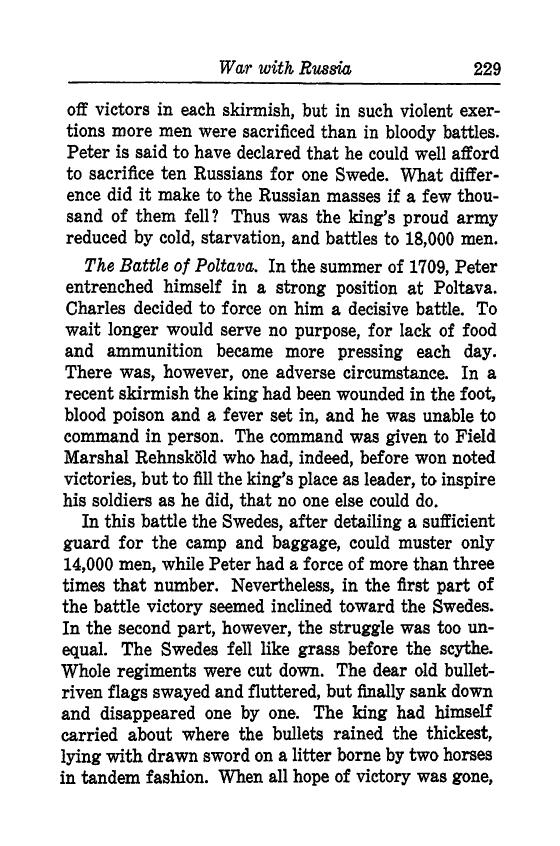
Full resolution (TIFF) - On this page / på denna sida - XIII. Reign of Charles XII, 1697–1718 - E. War with Russia Continued

<< prev. page << föreg. sida << >> nästa sida >> next page >>
Below is the raw OCR text
from the above scanned image.
Do you see an error? Proofread the page now!
Här nedan syns maskintolkade texten från faksimilbilden ovan.
Ser du något fel? Korrekturläs sidan nu!
This page has never been proofread. / Denna sida har aldrig korrekturlästs.
War with Russia 229
off victors in each skirmish, but in such violent exer-
tions more men were sacrificed than in bloody battles.
Peter is said to have declared that he could well afford
to sacrifice ten Russians for one Swede. What differ-
ence did it make to the Russian masses if a few thou-
sand of them fell? Thus was the king’s proud army
reduced by cold, starvation, and battles to 18,000 men.
The Battle of Poltava. In the summer of 1709, Peter
entrenched himself in a strong position at Poltava.
Charles decided to force on him a decisive battle. To
wait longer would serve no purpose, for lack of food
and ammunition became more pressing each day.
There was, however, one adverse circumstance. In a
recent skirmish the king had been wounded in the foot,
blood poison and a fever set in, and he was unable to
command in person. The command was given to Field
Marshal Rehnskold who had, indeed, before won noted
victories, but to fill the king’s place as leader, to inspire
his soldiers as he did, that no one else could do.
In this battle the Swedes, after detailing a sufficient
guard for the camp and baggage, could muster only
14,000 men, while Peter had a force of more than three
times that number. Nevertheless, in the first part of
the battle victory seemed inclined toward the Swedes.
In the second part, however, the struggle was too un-
equal. The Swedes fell like grass before the scythe.
Whole regiments were cut down. The dear old bullet-
riven flags swayed and fluttered, but finally sank down
and disappeared one by one. The king had himself
carried about where the bullets rained the thickest,
lying with drawn sword on a litter borne by two horses
in tandem fashion. When all hope of victory was gone,
<< prev. page << föreg. sida << >> nästa sida >> next page >>